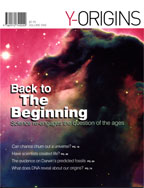IMAGINARY TIME, IMAGINARY UNIVERSES?
Hawking bases his theory on a mathematical concept called imaginary time, which is merely a mathematical concept and doesn’t represent reality. By using imaginary time, Hawking is able to make it appear that the universe never had a beginning. Once again, scientists uncomfortable with a beginning are seeking ways to avoid it. Hawking explains the reason for their avoidance: “So long as the universe had a beginning, we could suppose it had a creator.”7
Albert Einstein used a different mathematical concept to remove the appearance of a beginning. Later, Einstein admitted it to be his “biggest blunder.” According to theoretical physicist Julian Barbour, Hawking’s use of imaginary time may also be a blunder. It has been “widely criticized” and has “technical problems.”8
Most scientists are reluctant to endorse the concept of multiple universes because it isn’t based upon any evidence, and can only be theorized in imaginary time. Even its greatest advocates, Hawking and Rees, admit multiple universes can never be empirically verified. In The Elegant Universe, Brian Greene calls the multi-universe theory “a huge if.”9
Physicist Paul Davies explains why materialists are so fervent in their attempts to validate the multi-universe theory.
Whether it is God, or man, who tosses the dice, turns out to depend on whether multiple universes really exist or not. …
If instead, the other universes are … ghost worlds, we must regard our existence as a miracle of such improbability that it is scarcely credible.10
Regarding the multi-universe theory, Davies remarks, “Such a belief must rest on faith rather than observation.”11
Since the multi-universe theory is based upon faith, most scientists regard it as merely a hypothesis rather than a true scientific theory. Yet it still is being argued as a valid theory by Hawking, Rees, and others who seek a materialistic explanation for our origin. Investigative reporter Gregg Easterbrook, an investigative reporter for the Atlantic Monthly concludes his research on the multi-universe theory by stating: “The multi-verse idea rests on assumptions that would be laughed out of town if they came from a religious text.”12
Hawking and Rees should not be faulted for searching for a workable explanation; that’s what scientists do. But this issue raises a red flag, not on Hawking or Rees, but (perhaps) on a fundamental flaw of the scientific method. If it just happened to be true that God really was the cause of something, could science ever discover this truth? Wouldn’t science have to offer a materialistic explanation, no matter how unlikely, because the alternative is not an allowable option for them? This is, indeed, a problem, and it’s the issue that scientists who do see intelligent design in the cosmos are wrestling with.
Back | Endnotes | Next
|




